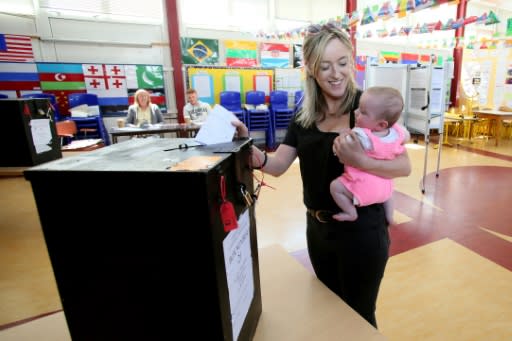Ireland tipped to repeal abortion ban by a landslide
Ireland voted overwhelmingly to liberalise some of the strictest abortion laws in Europe on Friday, according to exit polls in a historic referendum in the traditionally Catholic country. The vote to repeal a constitutional ban on terminations except in cases where the mother's life is in danger was predicted to win by a two-thirds majority. An Irish Times poll of 4,000 said the "Yes" camp was leading by 68 percent to 32 percent. Another poll by national broadcaster RTE suggested an even bigger victory, with 69 percent to 30 percent backing reforms. The Irish Times survey suggested that women voted by 70 percent in favour of the proposal and 30 percent against. Support among men was 65 percent pro-choice and 35 percent anti-abortion. "Thank you to everyone who voted today. Democracy in action. It?s looking like we will make history tomorrow," Prime Minister Leo Varadkar, who backs the reform, said in a tweet. People over 65, however, voted mostly against change. Among the youngest voters, 18-24-year-olds, the poll found 87 percent had voted to allow abortion, according to the poll. Nearly 3.5 million voters were asked whether they wanted to overturn the ban after an emotional and divisive campaign. People arriving at polling stations from the early morning spoke about the momentousness of a complex decision that in many cases pitted moral against religious beliefs. Chris Garvin, a 20-year-old working in human resources in Dublin, said: "It's a very, very important matter and I think it's going to affect everybody's lives in some way." Ireland has traditionally been one of the most religious countries in Europe. However, the Roman Catholic Church's influence has waned in recent years following a series of child sex abuse scandals. The referendum came three months before a visit by Pope Francis for the World Meeting of Families and three years after Ireland voted to legalise same-sex marriage despite the Church's opposition. "The fact that it's illegal for somebody in Ireland to seek medical treatment, having to travel outside the country and to feel that guilt, shame and isolation, it's absolutely shocking," said Belinda Nugent, 43, a community activist voting in north Dublin. "I took it really personally, this vote." But across the city, Finbar O'Regan, 50, said he wanted a "good, strong No vote". The unemployed Dublin voter said his mother had been sent to England to have him born and adopted. "I'm a staunch No. It's the life of an unborn baby. I'm one of the lucky ones," he said. - 'I'm very emotional' - The count begins at 9:00am (0800 GMT) on Saturday, with the result expected to be announced at Dublin Castle later in the day. Dublin voter Helen, 47, who did not want to give her surname, said: "I've been awake all night. I'm very emotional about this. "We've been marching about this for years and desperately trying to get successive governments to do something. Hopefully our day has come," she said, outside a polling station opposite Dublin's cathedral. Lawyer Rachel Cadden went to vote with her husband near the Dublin docks. "I'm pregnant so it's especially important for us," the 30-year-old said. "It means I can get the proper medical care that I should get and that my needs are put first whenever it comes to me being in hospital." At present Ireland's eighth amendment -- which could be repealed in the vote -- recognises the "right to life of the unborn" with an "equal right to life of the mother". But in the small town of Kilcullen, some 50 kilometres (32 miles) southwest of Dublin, voter Sean Murphy told AFP: "I don't see any reason to change from the position we are in at the moment". Canvassers were out on the streets holding up signs and wearing t-shirts. One in southwest Dublin offered hugs to people who voted in favour of repealing the ban. - 170,000 women - The eighth amendment to the Irish constitution was installed following a 1983 referendum which approved outlawing abortion. Anyone terminating a pregnancy in Ireland could face 14 years in jail. The ban has led to thousands of women travelling each year to neighbouring Britain, where terminations are legal, or increasingly turning to abortion pills sold online. Since 1983, around 170,000 Irish women have gone abroad for terminations. The law was tweaked in 2013 to allow terminations if the mother's life is at risk. The Irish government has proposed that if the eighth amendment is repealed, abortion will be allowed up to 12 weeks and between 12 and 24 weeks in exceptional circumstances. Nearly 3.5 million voters were asked whether they wanted to overturn the ban after a highly charged and divisive campaign Irish Prime Minister Leo Varadakar is backing the reform of the staunchly Catholic country's abortion laws Key facts on Ireland's abortion law




